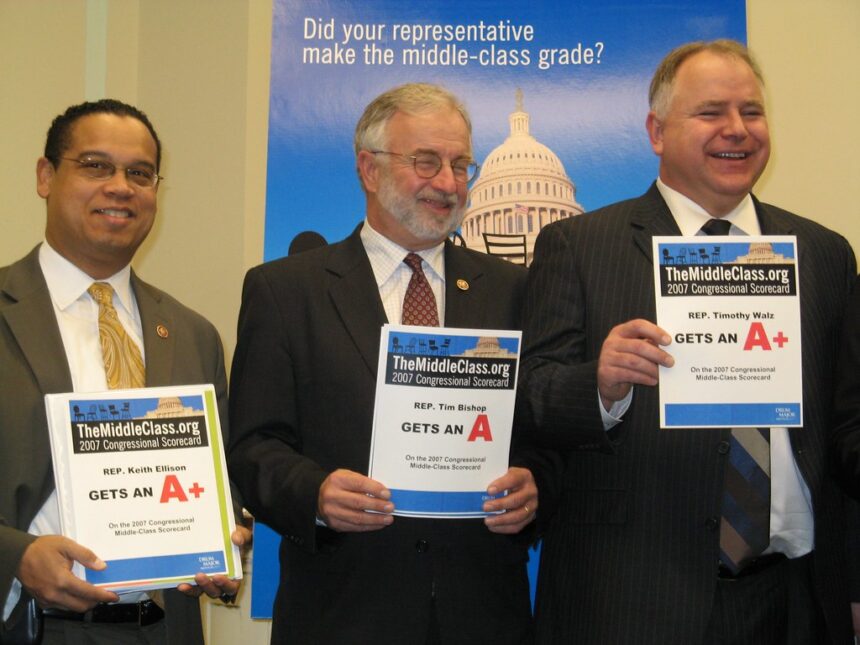The financial background of candidates has received a lot of attention as the race for the US presidency in 2024 intensifies.
The most striking contrast is between the recently-announced running mate of Kamala’s Harris and Minnesota Governor Tim Walz.
Walz’s financial position is strikingly modest compared with the wealthier competitors, which makes his roots in working class a central point of his election campaign.
Tim Walz: A lifetime of service
Tim Walz, in his first appearance as Kamala’s running mate since his selection, drew from his upbringing, which was rooted in the working class, and his career of public service to reach out to voters.
Walz has dedicated most of his career to public service. He is a retired public school teacher, and he was formerly a member of the Army National Guard.
The humble origins of his life and his dedication to serving others have not only helped shape his political opinions, but also his modest financial position.
Forbes estimates Walz’s Net Worth at just under $1 Million, making him more comparable to the average American his age.
According to a study conducted by the Federal Reserve Bank and University of Wisconsin in 2019, the median net wealth of Americans of Walz’s generation is $540,000 when pensions, benefits from social security, and other assets are taken into account.
Walz’s Wealth: A unique financial profile
Walz’s wealth is unique. Walz, and Gwen, a retired public school teacher, do not seem to have any stock, bonds or home.
They sold the five-bedroom house in Mankato Minnesota shortly after Walz was elected governor.
Their wealth is largely derived from the pensions they earned during their military, state and federal careers.
Forbes estimated that the pensions are worth about $1 million and make up almost their entire networth. The financial profile of this candidate is unusual compared to that of other vice presidents and presidential candidates.
Kamala Harris has an estimated net worth of $8 million. This is partly because her husband Doug Emhoff was a former entertainment lawyer.
Donald Trump, who is a Republican, has accumulated a wealth of $4.8 billion largely through his business ventures.
Robert F. Kennedy Jr. is an independent candidate who boasts of a networth around 15 million dollars.
The Harris-Walz ticket – Contrasts of wealth and background
This ticket is a contrast in both policy and financial backgrounds.
Walz is a common American. His modest income contrasts with Harris, whose background has been enriched by her wealth and that of her husband.
The financial struggles of his constituents, especially those from the Midwest, and in other swing states are major concerns.
Walz’s modesty in terms of finances is highlighted further by the lack of significant business or investment interests that his wife and he have.
The decision of the couple to sell their house and to rely solely on their government pensions shows their dedication to serving others over accumulating personal wealth.
The wealth of other candidates is a result of lucrative private ventures, speaking engagements and/or business interests.
Public perception of campaign strategies
Walz’s background in finance may be both a strength as well as a weakness for his campaign.
His modest net worth allows for him to be seen as someone who is aware of the challenges that many Americans face.
Voters who are dissatisfied with the wealthy elite will resonate with his story of service to others and modest financial means.
A lack of wealth can be seen as an obstacle in the political arena, where money is often translated into influence and resources.
Harris-Walz appears to use Walz’s background as a working class person to attract voters disillusioned by wealthier candidates.
Walz, at the Philadelphia rally compared his service to that of the former president Trump and said, “He has no idea what service is.” It’s not because he doesn’t care, but rather that he is too busy to serve others.
The message will resonate well with voters looking for candidates who understand their problems and represent their needs.
What lies ahead? Financial Disclosure and Prospects
Walz may reveal more information about his financial status as the election approaches.
The 2019 financial disclosures of his congressional office provide some insights into his assets. These include government pensions as well as a small savings account for college.
There are some unknowns, including the value of his pensions, and any possible changes to his financial position since becoming governor.
Walz’s finances are likely to get better if the Harris-Walz ticket is elected.
His federal pension value would increase as well.
Former vice presidents can also increase their income through book and speaking deals.
Walz’s finances are similar to those of Mike Pence, who was Donald Trump’s running-mate in 2016.
Pence’s financial position improved significantly when he left office. He was a governor from the Midwest with modest assets, mostly based on his pension.
Walz may see similar results if history repeats.
Walz’s modesty in terms of finances could be an asset as well as a liability, especially if he is to navigate a landscape that’s dominated by power and wealth.
No matter the result, the story of his life is a powerful narrative about a dedication to public service as well as a commitment towards values that are important to many American voters.
The post Tim Walz: Kamala’s VP choice is worth how much? This post may change as new information becomes available
This site is for entertainment only. Click here to read more






